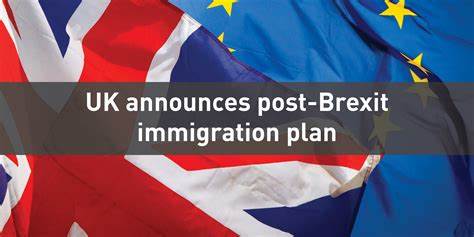英國板塊
Immigration
移民
Who cares?
誰會在乎呢?
New immigration rules would exclude the key workers Britain relies on. “Care work isn’t just bum wiping,” insists Karolina Gerlich. In the 12 years since she swapped her native Poland for Britain, aged 18, she has learnt that it involves being a “PA, a nurse, a therapist, an occupational therapist, a dietician and a friend”. She now runs a charity supporting other carers, while working as one herself. Yet under post-Brexit immigration rules due to take effect in January, a similar applicant would be turned down for a visa, since the job is classed as low-skilled. “I feel disrespected, offended and like my contribution to the economy and to the country has not been recognised at all.”
新的移民規則將會排除英國依賴的主要工作者。“護理工作不僅僅是擦屁股,”卡羅琳娜·格里奇堅持說。在她十二歲的時候將自己從波蘭人變成英國,這十二年里,她學會了做一名“助理、護士、治療師、職業治療師、營養師以及朋友。”她現在經營著一家慈善機構,支持其他護理人員,她自己也是做這樣的工作。然而,脫歐后的移民規則在一月生效,類似簽證的申請者會被拒絕,因為這類工作被歸類為低技能類。“我感到不受尊重、被冒犯,我對經濟和國家的貢獻根本沒有得到承認。”

The timing of the covid-19 pandemic puts Priti Patel, the hardline home secretary, in an awkward spot. Recognising that Britain’s vote to leave the EU in 2016 was in part down to a desire to curb immigration, she plans to end freedom of movement from the bloc and apply the same salary threshold (£25,600, or $31,200, for most) and skills requirement to prospective migrants wherever they come from. Yet many of the incomers such a policy would rule out—including care-home workers—are those classified by the government as the pandemic's “key workers”.
covid-19大流行爆發的時機讓強硬的內政大臣Priti Patel陷入了一個尷尬的境地。認識到英國在2016年投票退出歐盟的部分原因是希望遏制移民,她計劃解除歐盟公民流動自由,以及對來自任何地方的潛在移民適用同樣的工資門檻(最多為25600英鎊或31200美元)和技能要求。然而,這樣一項政策將排除許多移民——包括家庭護理人員——那些被政府列為流行病“關鍵工作者”的人。
譯文由可可原創,僅供學習交流使用,未經許可請勿轉載。












